Content
- Possible reasons
- Pathogenesis
- Complications
- Diagnostics
- Basic methods
- Additional research
- Treatment methods
- Medications
- Traditional methods
- Homeopathic treatment
- Forecast
- Video about interruptions in the work of the heart
Interruptions in the heart are referred to heart rhythm disorders and arrhythmias. Symptoms are caused by a fast or slow heart rate. Arrhythmia is not only a physiological disease. It may indicate certain pathologies that are of a neurocirculatory or cardiovascular endocrine nature.
Possible reasons
Interruptions in the heart (the reasons are of a different nature in cardiology) occur mainly due to a violation the required arrangement of cardiac electrical impulses, obstructed circulation or cardio-structural changes. Consistently, this entails interruptions in the heart of a healthy person. As a result, he may experience physiological tachycardia, it is associated with high physical activity, fever, stress, fever.
The second reason for the interruption of the work of the heart is neurosis. The sinus node of the heart is affected by the sympathetic nervous system based on the release of adrenaline.
Also, disruptions can be a consequence of taking certain medications, these include diuretics, antipsychotics and antibacterials. Sometimes, drops from a common cold provoke heart failure if consumed excessively without the appointment of an appropriate specialist.
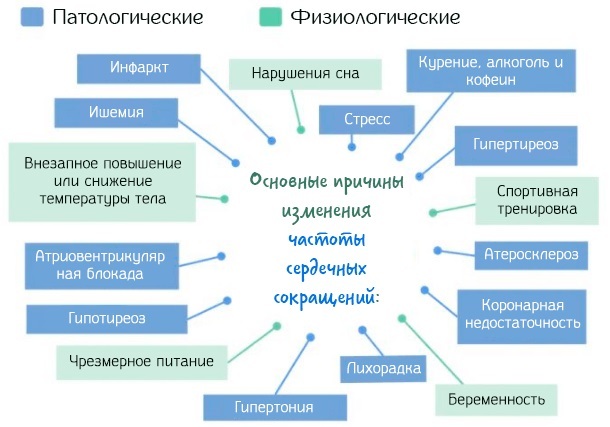
Smoking and excessive caffeine consumption also cause abnormalities in the functioning of the heart, which prevents the heart function correctly due to blocking of adrenaline receptors, an inhibitory mediator in the nervous system person.
People with increased functional activity of the thyroid gland, iron deficiency anemia and autoimmune thyroidin are quite often faced with interruptions in cardiac work. Atrial flutter occurs when blood pressure rises, the body has diabetes, chronic lung disease, and excessive alcohol consumption. Ventricular fibrillation causes chaotic and rapid heart failure, subsequently causing the heart to stop.
The reasons are:
- Myocardial infarction, which damages the heart walls.
- Cardiosclerosis and myocarditis disease, which reduce the myocardial blood supply by constricting the coronary artery. The disease begins to progress when blood cholesterol levels are much higher than normal.
- Congenital heart diseases, these include valvular disease, myocardial dystrophy and other diseases.
Extrasystole, according to cardiologists, carries a harmless reflex reaction of the nervous and autonomic systems, which controls the frequency of contractions. Actually, the same pathogenesis is directly related to heart failure during exacerbation of vegetative-vascular dystonia (VVD). An increase in blood acidity due to changes in the electrolyte balance, as well as excessive consumption insulin from food that contains a large amount of carbohydrates and fats affects interruptions in a heart.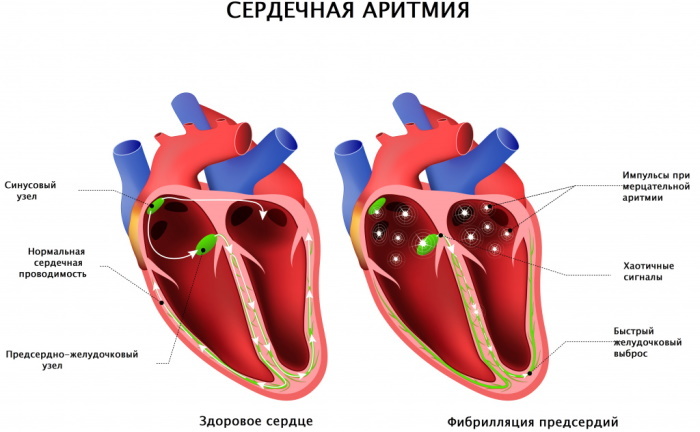
The reasons are not proper nutrition, which subsequently increases the heart rate. Also, the causes of such heart abnormalities can be foods that contain excessive capacity of sodium nitrate and glutamine. Experts point out the factors that affect the work of the heart during pregnancy and consider them relatively non-threatening to this situation, mainly disruptions occur due to hormonal changes.
Manifestations of malfunctions in the body are reflected:
- an increase in load due to an increased amount of circulating blood;
- in disorders associated with intestinal motility;
- deprivation of fluid in the early stages of pregnancy due to toxicosis.
In the presence of osteochondrosis, nerve roots are infringed with the help of intervertebral discs, which provokes autonomic disorders and interruptions in the heart.
Pathogenesis
If the heart rate is directly connected to the electrical system, it will cause malfunction. sinus node (natural pacemaker containing electrical cells and initiating heartbeat). Also, with the atrioventricular node, which transmits a signal to the ventricles from the atrium, because of this, in most cases, the work of the heart is disrupted.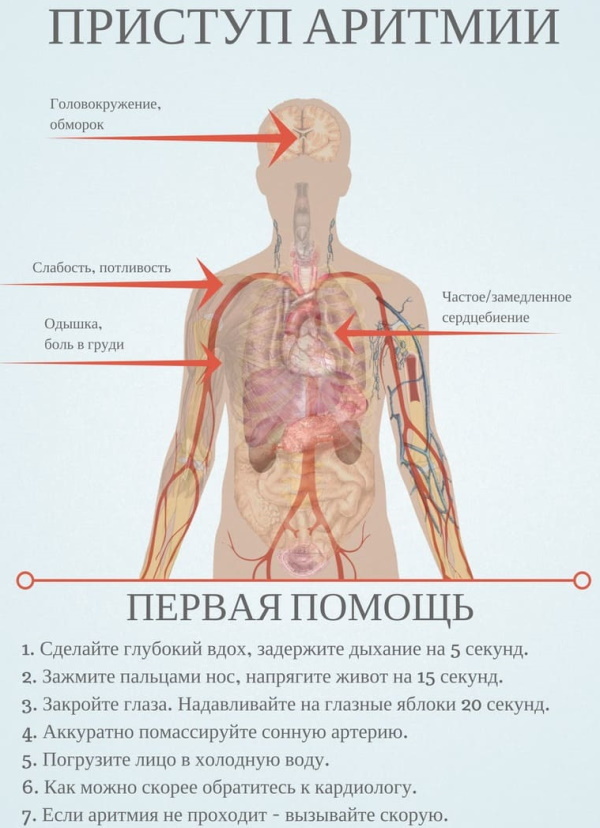
Symptoms can be different, it depends on the rhythm, experts point to:
- slow or fast heartbeats, chaotic or stable;
- sinus tachycardia, accompanied by a frequent heartbeat of 100 or more beats in 1 min;
- over ventricular tachycardia (occurs in the upper or lower chambers);
- atrial flutter (irregular heart rhythms);
- bradycardia (slow heart rate, less than 60 beats per minute);
- weakened sinus syndrome (when the pacemaker does not function normally, the heart rate decreases sharply and then increases sharply);
- sinus arrhythmia (occurs in children and adults with changes in cyclic breathing);
- extrasystole (unusual myocardial contraction).
Complications
Interruptions in the heart do not always make themselves felt, and remain asymptomatic, the reasons may indicate heart failure with varying intensity. This can cause mild chest discomfort or fainting (loss of consciousness) and suffocation.
The first signs of heart failure are marked by a rapid or slow pulse. Severe attacks of rapid heartbeat, a violation of the general state of health in a short-term form, which is accompanied by sudden weakness and dizziness. Tachycardia gives a feeling of tremor in the area of the heart, as well as compression pain. In severe enough cases, fear and shortness of breath occur. Heart attack is a likely complication associated with coronary artery disease.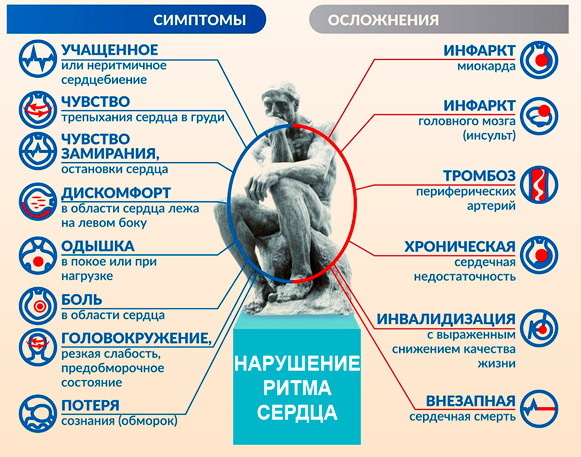
With bradycardia, the symptoms of which are manifested in a decrease in heart rate, semi-consciousness, low respiratory rate, complications are:
- cerebral ischemia;
- heart failure.
In the case of arrhythmias, there is a sensation of strong tremors in the heart, similar to atrial fibrillation (experienced by people over 50). In addition to these symptoms, there is severe shortness of breath and a state of fainting. Symptoms of heart failure have different types of autonomic disorders.
For example, when adrenaline is released into the blood, the number of heartbeats increases sharply, which immediately leads to a sharp a change in body temperature, begins to throw in heat, then abruptly in cold, then the tremor spreads throughout the body. With an increase in the level of insulin in the blood, the heart rate decreases sharply, the pulse becomes weaker, cold sweat appears. Violation of the heart rhythm after eating is accompanied by increased sweating, a feeling of discomfort in the abdomen and chest, and yawning.
Diagnostics
The beginning of determining the diagnosis of heart disease, heart failure or neurotic condition is to collect the necessary anamnesis. Pulse is measured, heart auscultation using a stethoscope.
Basic methods
A biochemical and general blood test is prescribed.
This is followed by the necessary instrumental diagnostics, these are:
- ECG (electrocardiography).
- ECG recorded continuously (round-the-clock monitoring of the heart using a portable recorder using Holter technique).
- Ultrasound of the heart (echocardiography).
- Recording the level of blood pressure, pulse and ECG (carried out using a treadmill, using physical activity).
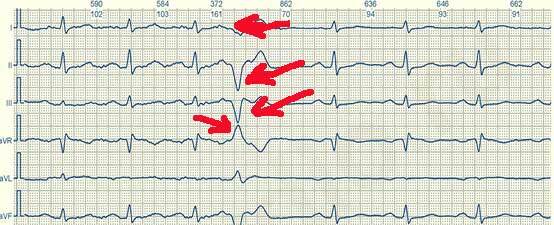
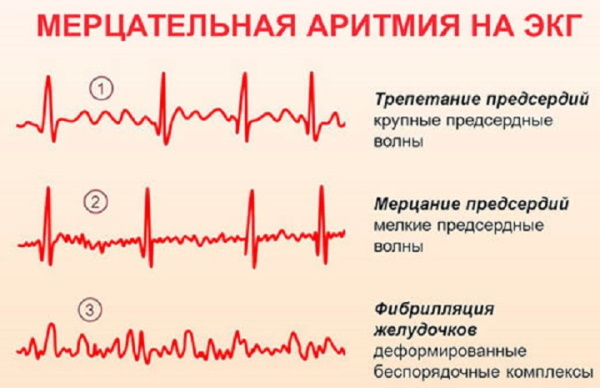
With atrial fibrillation, using an intra-esophageal echocardiograph (cutter probe that injected through the esophagus, to the place where the heart is located), the aberrant frequency of contraction is determined hearts.
Additional research
To obtain a complete anamnesis, additional studies are prescribed in the form of:
- Electrocardiography (ECG).
- A detailed blood test for Tropinin.
Additionally, it is necessary to prescribe a thorough differential diagnosis (to determine the specific causes cardiac abnormalities, endocrine, detection of diseases that affect circulatory disorders and the autonomic nervous system).
Treatment methods
Treatment of heart interruptions by specialists largely depends on the cause of the onset of the disease, on the nature of the disease, the reasons for the disruption of the heart and on the severity.
Medications
Physiological tachycardia and sinus arrhythmia, specialists treat with various medicinal drugs that reduce the contractions of the heart muscle and block adrenergic receptors: Metoprolol, Propranolol, Atenolol.
Cardiac output blockers: Quinidine, Disopyramide, Allapinin.
Drugs that help block calcium channels: Verapamil, Diltiazem.
Drugs that affect sinoatrial nodes and atrioventricular: Metoprolol; Cavredilol and other effective medicines for heart failure.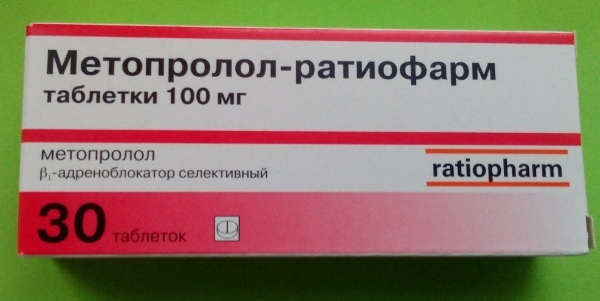
With supraventricular tachycardia and extrasystole of the ventricles, it is prescribed: Cavredilol, Vasokardin, Egilok.
The dosage of drugs is prescribed directly by a specialist and is strictly observed, since practically all heart medications have a number of side effects that can adversely affect orgasm.
For example, the drug Metoprolol has contraindications for weakness of the sinus nodes, when bradycardia, severe heart failure, hypotension are manifested, and the circulatory system is impaired. It is also excluded for pregnant women and during the lactation period. It is prescribed in the amount of 1 tablet 1 time per day.
Antiarrhythmic Allapinin is prescribed one tablet 3-4 times a day, for about 30 minutes. before meals. Side effects of the drug can manifest itself with dizziness, double vision in its action is note the blockage of the wired heart system, impaired liver and kidney function, and also a violation blood circulation.
In most cases, the drug Verapamil (Isoptin, Veracard) is used in the treatment of heart interruptions with a dosage established by a specialist 3 times a day. In each case, the individual dosage is calculated separately and is determined for each separately.
The use of verapamil can alter the functioning of the liver, cause fainting, sleep, urination, bring down the menstrual cycle and cause an attack of angina pectoris and myocardial infarction. Among its contraindications: arterial hypotension, bradycardia, severe heart failure, sick sinus syndrome, atrial fibrillation and atrial flutter.
The drug is not prescribed for children under 5 years of age and pregnant women. It should also be borne in mind that verapamil, when taken with beta-blockers, increases the risk of dysfunction. senior and atrioventricular nodes, sodium channel blockers are never used, at the same time antipsychotics. The drug should not be taken with grapefruit juice.
The drug Digoxin belongs to cardiac glycosides and helps to reduce the heart rate during tachycardia. It is prescribed strictly as directed in an individually established dosage and is used under ECG control in a hospital setting. Depending on the results of examination and diagnosis of joints, diuretics, anticoagulants, sedatives and others.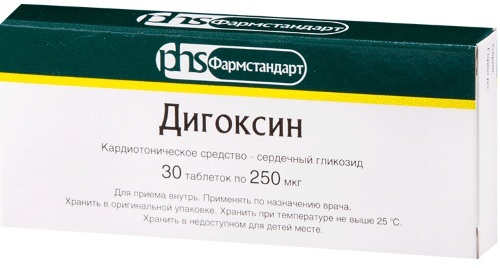
Doctors recommend taking all the vitamins of the B complex, vitamins A, E, C, PP, lecithin, and for tachycardia - magnesium preparations.
Taking into account the degree of danger of cardiac changes, physiotherapy treatment of cardiac arrhythmias are selective, since with structural changes in the myocardium such treatment contraindicated.
Very often, physiotherapy in the form of potassium chloride or propranolol electrophoresis sessions is used if patients have cardiac abnormalities with IVD (neurocirculatory dystonia).
Physiotherapists recommend bromine electrophoresis, oxygen therapy and electrosleep sessions, and balneological procedures (carbon dioxide, nitrogen, radon baths) to restore normal heart rate. With chronic heart failure, according to indications, surgical treatment can be carried out, consisting in cauterization of certain pathologically active areas of the myocardium using radio frequency ablation. With a decrease in heart rate and pathologies of a pacemaker, an operation is performed to install a pacemaker.
Traditional methods
Interruptions in the heart, the causes of which can be alleviated by alternative methods of radiation, while the prescribed medication cannot be ruled out.
First of all, it is necessary to add natural honey to the diet: consume 1 tbsp. l. honey on an empty stomach every day for a month. You can mix honey with lemon juice (2: 1), you can only tea with honey (preferably at night).
The next method is the use of copper appliques, which are recommended to be placed on the clavicle for at least 5-6 hours a day. It is also recommended to take fish oil containing omega-unsaturated fatty acids: 1 g per day for a month and a half.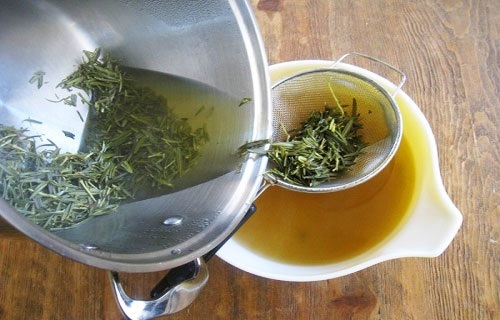
If you prefer to give it to herbal treatment, then herbalists advise preparing a decoction of the herb of five lobed motherwort. One tablespoon is brewed in 200 ml of water, taken 3-4 times a day, 1 tbsp. l. You can also use a decoction of mint (1 dec. L. 200 ml of water), use 1 tbsp. l. three times during the day.
Also, to improve the heartbeat, you can use a decoction of valerian roots, astragalus herb and cat licorice, as well as hawthorn fruits. It is possible to use alcoholic tincture from the pharmacy - 18 drops 2 times a day (second dose in the evening).
Homeopathic treatment
Homeopathic treatment, in its own way, is expressed in the administration of drugs in reduced doses. This type of treatment is also used to combat heart failure. One of the remedies is a hawthorn tincture in the form of drops. These drops are taken twice a day, with a lump of sugar (7 drops), which should be kept in the mouth until it dissolves.
The most recommended homeopathic remedies for arrhythmias:
- drops of Cactus grandiflorus (Selenicereus large-flowered, 20 drops each, 25 min. before meals, 2 times a day) diarrhea may be a side effect.
- Aconite D4 (tincture of the poisonous plant of the monastic bell);
- Lilium tigrinum (tincture of tiger lily);
- Calcarea carbonica (calcium carbonate, three times a week);
- Gnaphalium polycephalum 3X, HPUS (lead granules for sublingual use);
- Naia tripudens D12 (cobra point poison).
Homeopathic doctors remind that heart failure can be a sign of serious heart abnormalities, so homeopathic medicines are not are intended to replace traditional medical treatments for arrhythmias and should be used as an adjunct to allopathic treatments treatment. They cannot be used without a doctor's recommendation.
Forecast
The prognosis for physiological tachycardia in healthy people is favorable. But with obvious heart disease, work interruptions pose a significant risk. Every day, the heart beats an average of 100,000 times, pumping over 750 blood softeners.

With interruptions in the heart, the reasons seem to be not natural for the body, it stops working fully, the brain and all other organs cannot function normally.
A healthy heart is a healthy lifestyle, that is, an active one, the use of dairy and plant products with vitamins, calcium, potassium, iron and especially magnesium. To avoid a tendency to arrhythmias due to any overload, you need to sleep at least 7-8 hours, walk more, and also exclude alcohol and smoking.
Feeling interruptions in the heart, the reasons should be found out immediately, seek help from a cardiologist so that timely diagnosis and effective treatment - combined with proper prevention - helped to avoid dangerous pathological health consequences and life.
Video about interruptions in the work of the heart
Arrhythmia - interruptions in the work of the heart:



